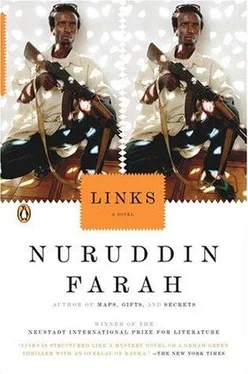She had more words now, thanks to the therapy given to her by foreign specialists, Irish volunteer teachers who spent a few months at a time at The Refuge. Makka’s words wove themselves into an embroidered pattern — her ellipses.
A wonder of affection, Makka gave huge kisses — and liberally. Raasta more than anyone else mined her wealth of emotions from deep down, where only she could tap, willy-nilly. Hugging Makka to herself, their cheeks touching, Raasta would mumble words, and Makka would repeat after her, altering the sequence slightly or changing the pronunciation. Then Makka’s mouth would remain open, and the words would fail her.
Everyone congregated around them, loving them. The girls helped the others cope with the stormy weather of clan politics. If there was one huge difference between Makka and Raasta, it had to do with memory. Makka was in the moment, and the moment was innocence, pure and simple. She was in no one else’s camp, only in her own. She belonged to no clan and to no one but herself. The Refuge provided her with a family, and she provided The Refuge with her absolute loyalty. By contrast, Raasta had been taught who she was, that is to say, what her clan family was, from the instant she opened her lungs with the cry of life.
“What was Faahiye’s attitude toward Makka?”
Bile rose in an instant surge of unease. “Just a minute, please,” he said, and was gone.
Minutes later, Jeebleh heard a toilet flushing, then footsteps returning.
IT APPEARED THAT BILE HAD REACHED FOR AND RETURNED WITH A NEW VOICE, retrieved from deep within. He was much calmer. “You see,” he said, “even though Faahiye may have been present physically, it seemed to those of us in daily contact with him that he was not all there.”
“How was that?” Jeebleh asked.
“Some of us felt he was on some sort of suicide trip. He behaved recklessly, going to the areas of the city where deadly fighting was raging. He’d take along a camera, like a tourist on a suicide mission.”
“Did he show anyone the photographs he took?”
“He wouldn’t even bother to print them!”
“Didn’t he train as a lawyer?” Jeebleh asked.
“A lawyer in a lawless land, jobless and unemployable.”
“Didn’t he commit come of his free time to The Refuge at least? Didn’t he help run it?”
“We all wished he had,” Bile answered.
Voltaire had said that good, honest work done in God’s name banished three of the greatest evils — boredom, vice, and poverty. Thinking about Faahiye’s lack of commitment to the jobs at hand made Jeebleh wonder whether he would have been easier to deal with if he had had jobs and worked at them. And would the same have stopped Somalis from going down the inevitable road of self-destruction, self-hate, waste, and famine? Evil and envy gain a solid foothold in the mind of the jobless. His thought led him elsewhere: to sex. Jeebleh imagined that Faahiye was starved of love and sex. He asked Bile as much: “Did sex occupy a prominent place in his mind?”
You might have thought that the earth had been pulled from under Bile. Jeebleh was regretting his question.
“Why do you ask?”
“Yeats said that sex is the subtext of every ruined relationship. Or am I misquoting him?”
“We’ll have to ask Seamus about that.”
“About Faahiye and sex?”
“No, about Irish poets and sex!”
Jeebleh repeated, “Was sex the subtext in Shanta and Faahiye’s embittered relationship?”
“Put that question to them when you see them.”
HALF AN HOUR LATER, BILE’S FEATURES HAD ROUGHENED AT THE EDGES, LIKE frozen butter exposed to sudden heat. He said, “I knew very little of what had gone on before I came. But it became obvious that my presence was causing a great upset in the home they had set up for themselves. I admit I was insensitive at first too. Of that I am certain, and I regret it all the time.”
“What did you do?”
“We shared a limited space. We were on top of one another, and spent a lot of time together. Shanta and Faahiye quarreled so savagely in the first months of Raasta’s life that I moved out and set up my own place, within easy walking distance. By then Faahiye had tried to force himself on Shanta, soon after the traditional forty-day convalescence period. I didn’t care to know about it, but I got to hear of it because Shanta told me of her own free will. There were subsequent quarrels, in which he became unbearably offensive, at one time suggesting that Shanta was saving herself for the only man she had ever truly loved, namely me. Then they worked out a modus vivendi agreeable to both. He looked after Raasta in the early hours of the day — Shanta doesn’t wake up until noon, she’s that kind of person. And she looked after the girl in the afternoons and at night. This way, I managed to have uninterrupted time with Raasta when it was Shanta’s turn. It was all very complicated. There were so many borders we couldn’t cross, and so many things we couldn’t do. It’s a great relief that Raasta — and later Makka, when she joined us — didn’t collapse into a pair of tearful misfits. I’ve no idea how, but the two girls knew where the paths to doom and despair lay, and they kept well away from them, thank God.”
Bile was in the vortex of a huge sorrow, but he concentrated his mind wholly on the telling of the story. His features took on the darker hue of fabric soaking overnight in water. Now that he was immersed in his sorrow, Bile’s expression put Jeebleh in mind of the color of southwestern Nigerian adire cloth at its finest.
“Do you think he’s taken the girls hostage?”
“I don’t know,” Bile said.
Jeebleh could see the weight of Bile’s gloom lowering him into further despair. His pupils reduced to a darkness extending inward, into infinity.
“With help from Caloosha?”
“I wish I knew,” Bile said.
Jeebleh watched another cloud of sadness descending on Bile, much like the one before, an acknowledgment of a huge loss. A few seconds later, he sensed a pale reverie spreading itself over his face.
“The sorrow that’s home to us!” Bile cried.
Jeebleh wasn’t sure whether Bile was articulating a difficult concept with death in mind, but he was obviously withdrawing into himself, barely aware that Jeebleh was in the room with him.
“I think I am the cause of the hurt of which Faahiye has never been able to speak, given that he is so correct and proper in his demeanor,” Bile said. “It’s possible, however, that the source of his hurt, which in the end ruined their relationship, was sex, or rather lack of it. Memory is regret! Memory is regret. But what can I say?”
Jeebleh reached out to touch Bile, pat his knee.
“If only he had left when he should have, and taken his wife and daughter with him,” Bile said, “things might have been different for all of us. Now sorrow permeates our air, pricks it, and we hurt. Everyone hurts. And there’s no hurt like that of an innocent man wrongly accused of a crime he hasn’t committed, no hurt like that of a wife spurned, a love not reciprocated, a matrimonial bed abandoned, children turned into battlefields.”
Bile held his head between his trembling hands, and Jeebleh was not sure if he heard a faint sobbing. He could hear his friend’s breathing, soft like the patter of a baby’s footsteps. A big hush, then Bile lifted his head. His cheeks were moist. “It was a real shame!” he said.
“What was?”
“That Shanta accused Faahiye so unfairly.”
“Of what? What did she accuse him of?”
“A crying shame!”
“This is why he left?”
But Bile wouldn’t go into more detail, he wouldn’t answer the question. His head shaking, he would only say, “I believe Faahiye is innocent, a man wrongly accused!”
Читать дальше












